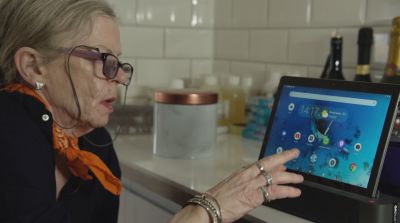
A consortium of partners including CENSIS has developed a new AI powered and IoT enabled device that helps identify when older or vulnerable people who live alone may need immediate medical support, using electricity or smart meter data to monitor the use of household appliances and electrical items.
CENSIS, the University of Edinburgh, Mydex CIC, Carebuilder, and Blackwood Homes and Care have built and trialled the technology as part of Blackwood Homes’ Peoplehood project across 19 households in Glasgow, Dundee, and Buckie in Morayshire.
The device is linked wirelessly to a smart meter or conventional electric meter and then disaggregates the data to identify certain high-power electrical items within the home, such as kettles, microwaves, washing machines, and electric showers. Using machine learning, it can tag each item and determine when they have been turned on and off, and, most importantly, spot any anomalies.
In a case where, for example, the person usually wakes up and boils a kettle to make tea by 8am, the monitoring device will identify this as normal behaviour. However, if the kettle has not been turned on by 9am, they will receive an automated text message. If there is no response, an alert will be sent to their nominated contacts – a family member, carer, neighbour, or a response service – who will be notified to check on them.
The device uses a hub process algorithm, which means all the data can be processed at the property, rather than at a central point. Together with an industry-leading personal data store from Mydex, this puts the individual in full control over who can see and access the data associated with their household.
The machine learning algorithm monitors the use of power in 10-second intervals, analysing the power signatures coming from the household. Over the course of the project, the University of Edinburgh built up a library of these signatures and tagged each high-power item in the houses to identify which ones are being used and when.
Read the news release including a case study and a link to the BBC website featuring this project.